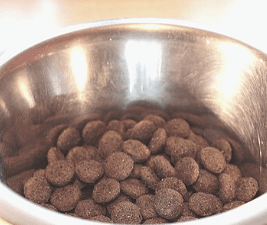In the decades we’ve been dog owners, we’ve never had a picky eater. We thought we did, once, but we were wrong. When Fran got Booker, her 7-year-old Boston Terrier, he wouldn’t eat the first couple of days. Turned out he didn’t like the food the breeder used. As soon as he got home and got a whiff of the stuff our other dogs ate, his no-eating days were over.
We have a couple of friends whose dogs are finicky. Interestingly – all of their dogs, as long as we’ve known them, have been picky eaters. We found that fascinating.
Rewards have many forms
One of the prime directives of dealing with dogs is that they always do what’s most rewarding. Dogs are pretty simple souls – they don’t have long-term agendas. If they get attention and better-tasting food by turning up their noses at their food bowls, they learn very quickly to turn up their noses. If the attention and tasty treats are rewards for joining the “clean plate club,” chances are that’s what they’ll do.
So we thought about our friends and their picky-eater dogs. And came to the conclusion that, on some level, they were encouraging their dogs’ behavior. Either by hovering over them for each bite, constantly offering alternatives, even yelling at them when they don’t eat.
You may wonder why a dog would like getting yelled at. Dogs don’t really understand the difference between “good” attention and “bad” attention. They just know the person they adore is paying attention. They have their person’s undivided attention for as long as they’re being a pain in the butt.
Picky eater routine
If you have a finicky dog, try to think of the routine that surrounds daily feeding. Do you obsess over every bite your dog takes? Are you catering to your dog by offering choices? Have you ever lost patience with his behavior?

Change, if you want it, takes some determination, patience, and an ability to resist those puppy-dog eyes. If you know you can’t, it’s probably smarter to admit things aren’t going to change and adjust your thinking instead.
The first step is to decide when, what, and where your dog will eat. You get to choose, not your dog. Pick a schedule and stick to it. The dog gets a limited time to eat. 10 minutes is plenty. After that, the bowl comes up, goes in the fridge, and is presented at the next meal. And every meal until eaten or goes bad.
This is a test of your will, but not your dog’s. No dog will voluntarily starve. If food is presented, and he’s hungry, he’ll eat. Unless he thinks “something better” is coming.
Figuring it out
After about three days, he may figure out that nothing else is on offer. It may be the hardest three days of your life, but it could be worth it. Won’t it be great when you don’t have the stress of worrying about whether or not your dog will eat? When you have a way of knowing when your dog doesn’t feel well because he doesn’t eat? Rather than a “mood” he’s in?
If you do want to convert your dog into an eager eater, use a brand and flavor of food that he liked for a period of time. We know some people choose to mix a couple of different brands so that if one company changes formulas, there will be some consistency in their dog’s diet.
Think it through
Of course you do need to take into account any medical condition your dog has and any regular medication he takes. If there is a medical reason your dog is “off his food,” that’s a different story entirely.
Our dogs do have preferences – Torque doesn’t care for fish. Booker can’t eat anything with pork. So we’ve found a food that has no fish or pork. Ours get special “treats” in their bowls on occasion. If we’re making scrambled eggs, we’ll put an extra one in for the dogs. Sprinkled on top of their regular food, at the regular time. If we’re making tuna salad, they get an extra celery stalk. Diced onto their regular food, at the regular time.
We know it’s weird that our dogs love celery. But they do, so we treat them to it. When we choose.
Our friends with the pick-eater dogs know all this stuff. They’ve chosen not to “fix” it, because, on some level, the current situation works for them. And that’s perfectly okay. As long as we don’t have to listen to them complain.








